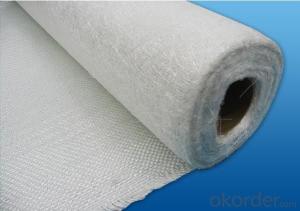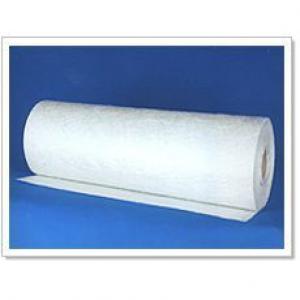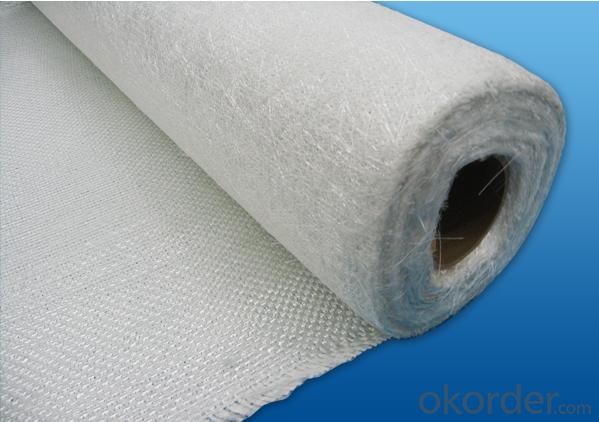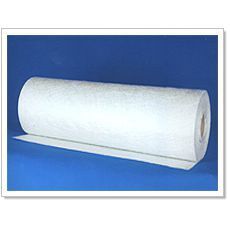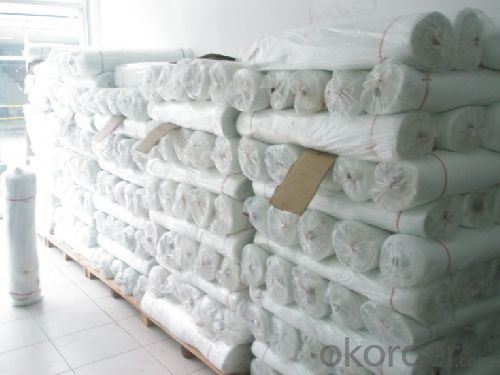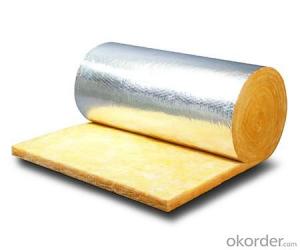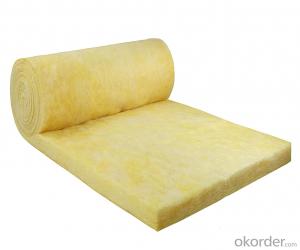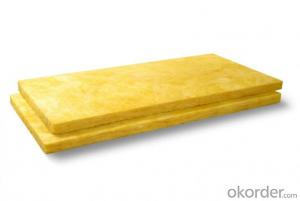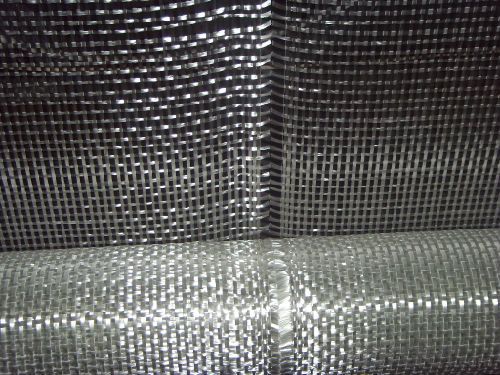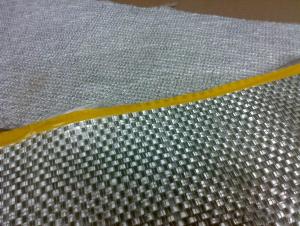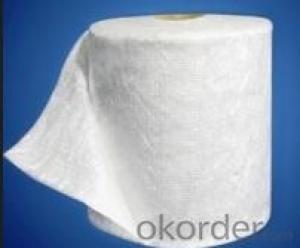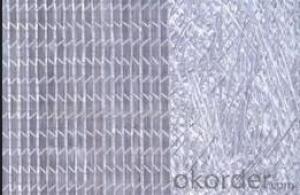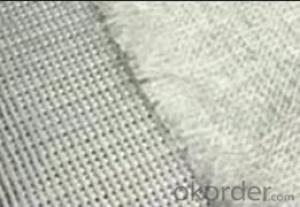Fiberglass Mat Tissue Woven Roving Combo Mat for Vehicle Bodies
- Loading Port:
- Shanghai
- Payment Terms:
- TT or LC
- Min Order Qty:
- 10000 kg
- Supply Capability:
- 100000 kg/month
OKorder Service Pledge
OKorder Financial Service
You Might Also Like
Description & application | |||||||||||||||||||||||||||||||||||||||
E-Glass Woven Roving Combo Mat is a complex mat made by stitching together woven roving and a layer of distributed chopped strand. Its main specification is woven roving with chopped strands.The product has a maximum width of 110 inches. This product can be used for boat manufacturing.This fabric is compatible with UP Resin, Vinyl ester resin, epoxy resin system etc. It is widely used in vehicle bodies and also can be used for panels, marine (boat hulls and decks), pipeline, lamination and structural profiles etc. | |||||||||||||||||||||||||||||||||||||||
Product Features | |||||||||||||||||||||||||||||||||||||||
Increase strength, reduce product weight and better surface finish. | |||||||||||||||||||||||||||||||||||||||
General parameters | |||||||||||||||||||||||||||||||||||||||
| |||||||||||||||||||||||||||||||||||||||
FAQ | |||||||||||||||||||||||||||||||||||||||
Storage: Delivery Time: 10-15 days after receiving the advance payment or acceptable L/C. | |||||||||||||||||||||||||||||||||||||||
- Q: Is fiberglass mat tissue suitable for wind energy applications?
- Indeed, fiberglass mat tissue proves to be a fitting choice for wind energy applications. This lightweight and resilient material is often employed in the fabrication of wind turbine blades. It possesses remarkable strength and rigidity, rendering it well-suited to endure the formidable strains and pressures exerted on wind turbines. Furthermore, fiberglass mat tissue exhibits resistance against corrosion and deterioration caused by UV radiation, thereby guaranteeing the durability and functionality of wind turbine blades. In summary, the integration of fiberglass mat tissue into wind energy applications enables the creation of efficient and dependable wind turbines capable of generating clean and sustainable energy.
- Q: What is the typical width of fiberglass mat tissue rolls?
- The typical width of fiberglass mat tissue rolls is around 1 meter or 3 feet.
- Q: What are the advantages of using fiberglass mat tissue?
- There are several advantages to using fiberglass mat tissue in various applications. Firstly, fiberglass mat tissue is lightweight, making it easy to handle and transport. This makes it a practical choice for construction and manufacturing industries. Secondly, fiberglass mat tissue offers excellent strength and durability. It has a high tensile strength, which means it can withstand heavy loads and resist tearing or breaking. This makes it an ideal material for reinforcing structures and providing structural integrity. Additionally, fiberglass mat tissue is highly resistant to corrosion, chemicals, and weathering. It does not rust, rot, or degrade when exposed to harsh environmental conditions, making it suitable for outdoor applications. Another advantage of using fiberglass mat tissue is its versatility. It can be easily molded into different shapes and sizes, making it suitable for a wide range of applications. Whether it's used for building materials, automotive parts, or even boat hulls, fiberglass mat tissue can be tailored to meet specific design requirements. Furthermore, fiberglass mat tissue is an excellent thermal insulator. It can effectively trap heat, making it energy-efficient and cost-effective for insulation purposes. This can contribute to reducing energy consumption and lowering heating or cooling costs in buildings. Lastly, fiberglass mat tissue is fire-resistant. It does not ignite easily and can withstand high temperatures without melting or releasing toxic fumes. This makes it a safe choice for applications where fire safety is a concern, such as in the construction of fire-resistant doors or insulation materials. In summary, the advantages of using fiberglass mat tissue include its lightweight nature, strength and durability, resistance to corrosion and weathering, versatility in design, thermal insulation properties, and fire resistance. These qualities make it a highly desirable material in various industries and applications.
- Q: How is fiberglass mat tissue made?
- Fiberglass mat tissue is made through a process called wet-laid process, which involves several steps. First, glass fibers are created by melting and extruding glass through small holes to form continuous filaments. These filaments are then coated with a sizing agent to improve their handling properties and strengthen the final product. Next, the glass fibers are chopped into short lengths to create a fiber mat. This is usually done using a knife or a rotary chopper. The chopped fibers are then collected and formed into a thin layer on a moving conveyor belt. In parallel to this, a binder solution is prepared by mixing a synthetic resin with water. This solution is then sprayed onto the fiber mat to wet and bind the fibers together. The amount of binder used determines the strength and flexibility of the final product. To ensure uniform distribution of the binder and proper consolidation of the mat, it passes through a series of rollers. These rollers apply pressure to remove excess water, squeeze the fibers together, and promote bonding between the fibers. Once the mat is consolidated and the desired thickness is achieved, it is dried in an oven or through hot air currents. This removes any remaining moisture and cures the binder, transforming it into a solid resin. After drying, the fiberglass mat tissue is wound into rolls for storage or further processing. It can be used as a reinforcing material in various industries, such as construction, automotive, and aerospace, due to its excellent strength, corrosion resistance, and thermal insulation properties.
- Q: Is fiberglass mat tissue biodegradable?
- No, fiberglass mat tissue is not biodegradable.
- Q: What are the applications of fiberglass mat tissue?
- Fiberglass mat tissue is commonly used in various applications, including but not limited to, the construction industry, automotive manufacturing, and the production of composite materials. It is used as a reinforcement material in the construction of walls, roofs, and floors, providing strength and durability. In the automotive industry, fiberglass mat tissue is used for sound insulation and as a reinforcement material in the production of car parts. Additionally, it is widely utilized in the manufacturing of composite materials, such as fiberglass-reinforced plastics, due to its high strength-to-weight ratio and excellent corrosion resistance.
- Q: Is fiberglass mat tissue suitable for agricultural applications?
- Yes, fiberglass mat tissue is suitable for agricultural applications. It is a versatile material that offers several benefits for use in the agricultural industry. Fiberglass mat tissue is resistant to moisture, chemicals, and UV radiation, making it ideal for applications such as greenhouse roofing, animal enclosures, and agricultural equipment. It provides excellent insulation properties, helping to regulate temperature and protect crops or livestock from extreme weather conditions. Additionally, fiberglass mat tissue is lightweight, easy to install, and durable, making it a cost-effective choice for agricultural projects. Overall, fiberglass mat tissue is a suitable material for various agricultural applications, offering durability, versatility, and protection for the farming industry.
- Q: How does the porosity of fiberglass mat tissue affect its performance?
- The porosity of fiberglass mat tissue plays a significant role in determining its performance. Porosity refers to the density of tiny pores or holes in the material, which affects the material's ability to absorb and hold fluids, as well as its strength and durability. Firstly, the porosity of fiberglass mat tissue influences its absorption capability. A higher porosity allows the tissue to absorb more fluids, such as resins or binders, during the manufacturing process. This absorption is crucial as it ensures better adhesion between the fiberglass mat and the bonding material, resulting in a stronger and more durable end product. Secondly, the porosity of the fiberglass mat tissue affects its strength and stiffness. Lower porosity generally indicates higher density and a more tightly packed structure, resulting in increased strength and stiffness. This is beneficial in applications where the material needs to withstand high mechanical stresses or act as a structural component. Additionally, the porosity of the fiberglass mat tissue impacts its thermal and acoustic insulation properties. Higher porosity typically leads to better thermal and acoustic insulation due to the increased number of air pockets within the material. These air pockets act as barriers, reducing heat transfer and sound transmission, making the material suitable for applications requiring thermal or acoustic insulation. Furthermore, the porosity of fiberglass mat tissue can influence its filtration capabilities. If the material has a high porosity, it can trap and hold particles more effectively, making it suitable for use in filtration systems. Conversely, a low porosity may allow for better flow rates, making it more suitable for applications where fluid permeability is important, such as drainage applications. In summary, the porosity of fiberglass mat tissue affects its performance in various ways. It determines its absorption capability, strength, stiffness, thermal and acoustic insulation properties, filtration capabilities, and fluid permeability. Therefore, understanding and controlling the porosity of fiberglass mat tissue is essential to ensure optimal performance in a wide range of applications.
- Q: Is fiberglass mat tissue water-resistant?
- Indeed, fiberglass mat tissue exhibits water resistance. Fiberglass, a substance comprised of delicate glass fibers intricately woven into a mat, undergoes a process of being layered with a water-resistant substance, such as a resin or gel coat, in order to heighten its ability to repel water. The water-resistant coating acts as a barrier, preventing water from infiltrating the fiberglass mat, rendering it suitable for a wide range of applications that entail contact with water or moisture, such as the construction of boat hulls, shower stalls, and outdoor furniture. However, it is crucial to acknowledge that although fiberglass mat tissue possesses water resistance, it does not possess complete waterproofness. If not properly maintained or exposed to prolonged and excessive moisture, it may still absorb limited amounts of water over time.
- Q: Does fiberglass mat tissue require any surface preparation before application?
- Yes, fiberglass mat tissue typically requires some surface preparation before application. This is to ensure proper adhesion and bonding between the fiberglass mat tissue and the surface it is being applied to. The exact surface preparation required may vary depending on the specific application and the condition of the surface. However, some common steps in surface preparation for fiberglass mat tissue include cleaning the surface to remove any dirt, grease, or other contaminants, sanding or roughening the surface to create a better bonding surface, and applying a primer or other bonding agent if necessary. It is important to carefully follow the manufacturer's instructions and recommendations for surface preparation to ensure the best results and optimal performance of the fiberglass mat tissue.
Send your message to us
Fiberglass Mat Tissue Woven Roving Combo Mat for Vehicle Bodies
- Loading Port:
- Shanghai
- Payment Terms:
- TT or LC
- Min Order Qty:
- 10000 kg
- Supply Capability:
- 100000 kg/month
OKorder Service Pledge
OKorder Financial Service
Similar products
Hot products
Hot Searches
Related keywords
